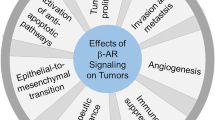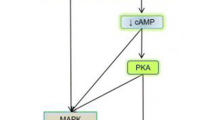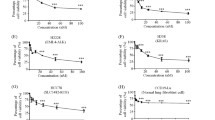Abstract
β-blockers having specific affinities to β-adrenergic receptors are routinely used to treat cardiovascular problems. Additionally, it has been demonstrated that these drugs can be effective in treating apoptosis-related diseases. The current study was conducted to investigate the cytotoxic and apoptotic effects of β-1 selective esmolol, β-2 selective ICI-118,551, and non-selective nadolol blockers on the cancerous and healthy lung cells. MTT test was used to evaluate cytotoxicity. Apoptotic actions were examined by using Annexin V-FITC/PI assay, JC-1 staining, ROS test, and the determination of the caspase-4 and -9, Bcl-2, Bax, Bax/Bcl-2, and JNK levels. Although the MRC-5 showed greater resistance than A549 cells, the β-blockers at 150–250 µM exhibited different levels of cytotoxic effect on both lung cell lines. Esmolol was found to be the most ineffective blocker and the increases in Bcl-2 protein levels were appeared to be effective in resistance to this drug. The increases in reactive oxygen species (ROS) together with the increase in caspase-4 and Bax protein levels have been shown to play a role in ICI-118,551 induced lung cell death. Nadolol was the most effective blocker increasing the total apoptotic cell population in both lung cells, which was based on both mitochondrial and endoplasmic reticulum stress. When the selectivities of the β-blockers are considered, it seems that β-2 specific antagonism predominantly mediated the death of lung cells, and the overwhelming factors causing apoptosis mainly varied depending on the selectivity of the blockers.





Similar content being viewed by others
References
Madamanchi A (2007) β-Adrenergic receptor signaling in cardiac function and heart failure. Mcgill J Med 10:99–104
Ali DC, Naveed M, Gordon A, Majeed F, Saeed M, Ogbuke MI, Atif M, Zubair HM, Changxing L (2020) β-Adrenergic receptor, an essential target in cardiovascular diseases. Heart Fail Rev 25:343–354
Frishman WH (2016) Beta-adrenergic receptor blockers in hypertension: alive and well. Prog Cardiovasc Dis 59:247–252
Pasquier E, Ciccolini J, Carre M, Giacometti S, Fanciullino R, Pouchy C, Montero MP, Serdjebi C, Kavallaris M, André N (2011) Propranolol potentiates the anti-angiogenic effects and anti-tumor efficacy of chemotherapy agents: implication in breast cancer treatment. Oncotarget 2:797–809
Liao X, Che X, Zhao W, Zhang D, Bi T, Wang G (2010) The β-adrenoceptor antagonist, propranolol, induces human gastric cancer cell apoptosis and cell cycle arrest via inhibiting nuclear factor κB Signaling. Oncol Rep 24:1669–1676
Wolter JK, Wolter NE, Blanch A, Partridge T, Cheng L, Morgenstern DA, Podkowa M, Kaplan DR, Irwin MS (2014) Anti-tumor activity of the beta-adrenergic receptor antagonist propranolol in neuroblastoma. Oncotarget 5:161–172
Zhou C, Chen X, Zeng W, Peng C, Huang G, Li X, Ouyang Z, Luo Y, Xu X, Xu B, Wang W, He R, Zhang X, Zhang L, Liu J, Knepper TC, He Y, McLeod HL (2016) Propranolol induced G0/G1/S phase arrest and apoptosis in melanoma cells via AKT/MAPK pathway. Oncotarget 7:68314–68327
Powe DG, Voss MJ, Zänker KS, Habashy HO, Green AR, Ellis IO, Entschladen F (2010) Beta-blocker drug therapy reduces secondary cancer formation in breast cancer and improves cancer specific survival. Oncotarget 1:628–638
De Giorgi V, Grazzini M, Gandini S, Benemei S, Lotti T, Marchionni N, Geppetti P (2011) Treatment with β-blockers and reduced disease progression in patients with thick melanoma. Arch Intern Med 171:779–781
Barron TI, Connolly RM, Sharp L, Bennett K, Visvanathan K (2011) Beta blockers and breast cancer mortality: a population-based study. J Clin Oncol 29:2635–2644
Melhem-Bertrandt A, Chavez-MacGregor M, Lei X, Brown EN, Lee RT, Meric-Bernstam F, Sood AK, Conzen SD, Hortobagyi GN, Gonzalez-Angulo AM (2011) Beta-blocker use is associated with improved relapse-free survival in patients with triple-negative breast cancer. J Clin Oncol 29:2645–2652
Zhang D, Ma Q, Shen S, Hu H (2009) Inhibition of pancreatic cancer cell proliferation by propranolol occurs through apoptosis induction: the study of β-adrenoceptor antagonist’s anticancer effect in pancreatic cancer cell. Pancreas 38:94–100
Ji Y, Li K, Xiao X, Zheng S, Xu T, Chen S (2012) Effects of propranolol on the proliferation and apoptosis of hemangioma-derived endothelial cells. J Pediatr Surg 47:2216–2223
Wong A, Hardy KL, Kitajewski AM, Shawber CJ, Kitajewski JK, Wu JK (2012) Propranolol accelerates adipogenesis in hemangioma stem cells and causes apoptosis of hemangioma endothelial cells. Plast Reconstr Surg 130:1012–1021
Pasquier E, Street J, Pouchy C, Carre M, Gifford AJ, Murray J, Norris MD, Trahair T, Andre N, Kavallaris M (2013) β-blockers increase response to chemotherapy via direct antitumour and anti-angiogenic mechanisms in neuroblastoma. Br J Cancer 108:2485–2494
Mossman T (1983) Rapid colorimetric assay for cellular growth and survival: application to proliferation and cytotoxicity assays. J Immunol Methods 65:55–63
Raisova M, Hossini AM, Eberle J, Riebeling C, Wieder T, Sturm I, Daniel PT, Orfanos CE, Geilen CC (2001) The Bax/Bcl-2 ratio determines the susceptibility of human melanoma cells to CD95/Fas-mediated apoptosis. J Investig Dermatol 117:333–340
Du L, Fei Z, Song S, Wei N (2017) Antitumor activity of Lobaplatin against esophageal squamous cell carcinoma through caspase-dependent apoptosis and increasing the Bax/Bcl-2 ratio. Biomed Pharmacother 95:447–452
Hou WC, Miao XH, Ma LJ, Bai XX, Liu Q, Song L (2017) Withaferin A induces apoptosis in rat C6 glioma cells through regulating NF-ΚB nuclear translocation and activation of caspase cascade. Afr J Tradit Complement Altern Med 14:319–324
Vucicevic K, Jakovljevic V, Colovic N, Tosic N, Kostic S, Glumac I, Pavlovic S, Karan-Djurasevic T, Colovic M (2016) Association of Bax expression and Bcl2/Bax ratio with clinical and molecular prognostic markers in chronic lymphocytic leukemia. J Med Biochem 35:150–157
Lue H, Dewor M, Leng L, Bucala R, Bernhagen J (2011) Activation of the JNK signalling pathway by macrophage migration inhibitory factor (MIF) and dependence on CXCR4 and CD74. Cell Signal 23:135–144
Jing LIU, Anning LIN (2005) Role of JNK activation in apoptosis: a double-edged sword. Cell Res 15:36–42
Ma X, Zhao T, Ouyang T, Xin S, Ma Y, Chang M (2014) Propranolol enhanced adipogenesis instead of induction of apoptosis of hemangiomas stem cells. Int J Clin Exp Pathol 7:3809–3817
Hu P, He J, Liu S, Wang M, Pan B, Zhang W (2016) β2-adrenergic receptor activation promotes the proliferation of A549 lung cancer cells via the ERK1/2/CREB pathway. Oncol Rep 36:1757–1763
Zhang J, Li H, Zhou G, Wang Y (2014) Changes of endoplasmic reticulum stress-and apoptosis-related factors in rat cerebral cortex following controlled hypotension. J S Med Univ 34:1804–1808
Liu D, Liu Y, Meng X, Zhiwei XU (2014) Effect of esmolol on myocardial apoptosis and cardiac function in rats with sepsis. Chongqing Med 31:4181–4184
Lu Y, Yang Y, He X, Dong S, Wang W, Wang D, Zhang P (2017) Esmolol reduces apoptosis and inflammation in early sepsis rats with abdominal infection. Am J Emerg Med 35:1480–1484
Smith SKS, Smith DM (2002) Beta blockade induces apoptosis in cultured capillary endothelial cells. Vitro Cell Dev Biol Anim 38:298–304
Acknowledgements
This study was supported by Grants from The Scientific and Technological Research Council of Turkey (TUBİTAK) with 218Z071 numbered project.
Author information
Authors and Affiliations
Contributions
BKY conceived, designed, and supervised the project, performed the experiments, computations, analyzed the data and wrote the manuscript, provided financial support and final approval of the manuscript. FG, FA and KK contributed to the study conception and design, performed the experiments and reviewed the manuscript. NSO performed the experiments, computations, analyzed the data and reviewed the manuscript. VK performed the computations, analyzed the data, reviewed the manuscript and provided environmental support.
Corresponding author
Ethics declarations
Conflict of interest
The authors have stated explicitly that there are no conflicts of interest in connection with this article.
Additional information
Publisher's Note
Springer Nature remains neutral with regard to jurisdictional claims in published maps and institutional affiliations.
Rights and permissions
About this article
Cite this article
Kavakcıoğlu Yardımcı, B., Geyikoglu, F., Aysin, F. et al. The cytotoxic and apoptotic effects of beta-blockers with different selectivity on cancerous and healthy lung cell lines. Mol Biol Rep 48, 4009–4019 (2021). https://doi.org/10.1007/s11033-021-06409-7
Received:
Accepted:
Published:
Issue Date:
DOI: https://doi.org/10.1007/s11033-021-06409-7




